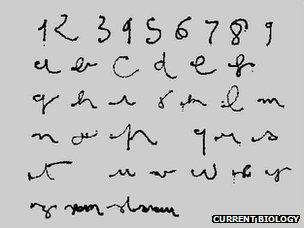Optical illusion aids eye-writing via computer screen
- Published

With training, people can use eye movements to write smooth longhand letters and numbers
An optical illusion could speed up the rate at which people who can only move their eyes can communicate.
French scientist Dr Jean Lorenceau has found an illusion that uses moving dots that trick the eyes into making smooth movements.
Using it to steady his eyes meant he could use those same movements, with the help of an eye-tracking video camera, to write letters and numbers.
He can now write 20-30 characters a minute using the technique.
Signature sight
The optical illusion used by Dr Lorenceau dates from 1970 when a psychologist noticed that the appearance of motion was induced when he projected an image of dots that switched between black and white.
While watching examples of this illusion, which is known as " <link> <caption>reverse phi motion</caption> <url href="http://psy2.ucsd.edu/~sanstis/Stuart_Anstis/Reverse_phi.html" platform="highweb"/> </link> ", Dr Lorenceau realised it let him exert control over some sorts of eye movements in a way that was usually impossible.
Prior efforts to use eye tracking to write letters have typically foundered because the human eye is constantly in motion and resists being constrained to move smoothly enough to trace characters.
Writing in Current Biology, Dr Lorenceau said he had done experiments to see if the effect was portable and had found that, with as little as 90 minutes training, others could gain the same kind of control.
Further experiments are being planned with sufferers of motor neurone disease, many of whom can only communicate by winking or making other tiny facial movements.
Dr Lorenceau, who is based at France's National Centre for Scientific Research, said the eye-tracking system might have other benefits.
"The discovery also provides a tool to use smooth pursuit eye movements as a pencil to draw, write, or generate a signature," he said.
- Published7 July 2012
- Published5 July 2012
- Published16 May 2012